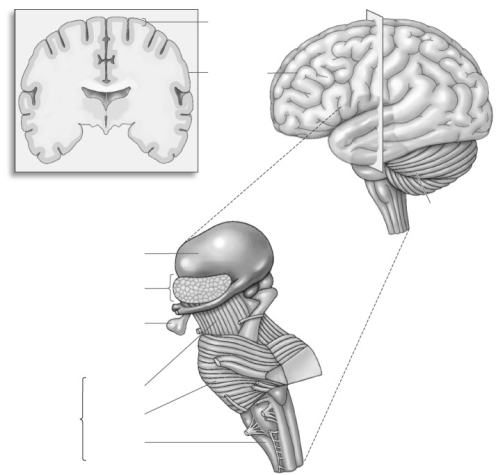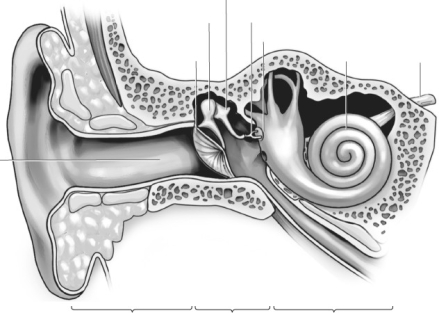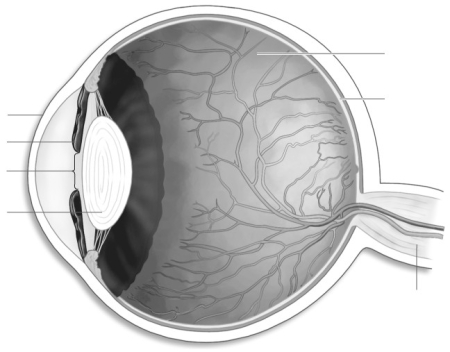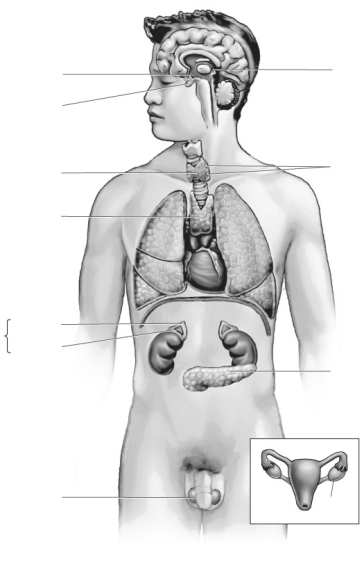Deck 27: The Nervous and Endocrine System
Question
Question
Question
Question
Question
Question
Question
Question
Question
Question
Question
Question
Question
Question
Question
Question
Question
Question
Question
Question
Question
Question
Question
Question
Question
Question
Question
Question
Question
Question
Question
Question
Question
Question
Question
Question
Question
Question
Question
Question
Question
Question
Question
Question
Question
Question
Question
Question
Question
Question
Question
Question
Question

Unlock Deck
Sign up to unlock the cards in this deck!
Unlock Deck
Unlock Deck
1/53
Play
Full screen (f)
Deck 27: The Nervous and Endocrine System
1
The functional unit of the nervous system, which transmits messages, is the:
A) glial cell.
B) brain.
C) nerve.
D) neuron.
A) glial cell.
B) brain.
C) nerve.
D) neuron.
neuron.
2
Adding 2 + 2 requires using which of the following types of neuron?
A) interneuron
B) sensory neuron
C) motor neuron
D) glial cell.
A) interneuron
B) sensory neuron
C) motor neuron
D) glial cell.
interneuron
3
Deciding to walk across the room uses which of the following types of neuron?
A) interneuron
B) sensory neuron
C) motor neuron
D) glial cell.
A) interneuron
B) sensory neuron
C) motor neuron
D) glial cell.
interneuron
4
Which of the following would most directly cause a response to something perceived by an animal in its surroundings?
A) interneurons
B) autonomic neurons
C) efferent neurons
D) parasympathetic neurons
E) afferent neurons
A) interneurons
B) autonomic neurons
C) efferent neurons
D) parasympathetic neurons
E) afferent neurons

Unlock Deck
Unlock for access to all 53 flashcards in this deck.
Unlock Deck
k this deck
5
Before an action potential begins, sodium ions have a greater concentration:
A) inside the neuron's cell membrane.
B) outside the neuron's cell membrane.
C) Neither of the above answers is correct. The sodium concentration is the same outside and inside the cell's membrane.
A) inside the neuron's cell membrane.
B) outside the neuron's cell membrane.
C) Neither of the above answers is correct. The sodium concentration is the same outside and inside the cell's membrane.

Unlock Deck
Unlock for access to all 53 flashcards in this deck.
Unlock Deck
k this deck
6
When you step on a tack and jump back, which of the following is controlling the jump?
A) brain and spinal cord
B) spinal cord only
C) brain only
D) None of the above is involved in this response.
A) brain and spinal cord
B) spinal cord only
C) brain only
D) None of the above is involved in this response.

Unlock Deck
Unlock for access to all 53 flashcards in this deck.
Unlock Deck
k this deck
7
Long-term depression is associated with:
A) the application of a continuous low-level stimulus.
B) the inability of neurons to fire an electrical impulse.
C) the inability to retain long-term memory.
D) increased sensitivity to an electrical stimulation.
E) increased reuptake of serotonin.
A) the application of a continuous low-level stimulus.
B) the inability of neurons to fire an electrical impulse.
C) the inability to retain long-term memory.
D) increased sensitivity to an electrical stimulation.
E) increased reuptake of serotonin.

Unlock Deck
Unlock for access to all 53 flashcards in this deck.
Unlock Deck
k this deck
8
Where do you find cerebrospinal fluid?
A) around the spinal cord
B) around the brain
C) around nerves
D) around the brain and spinal cord
A) around the spinal cord
B) around the brain
C) around nerves
D) around the brain and spinal cord

Unlock Deck
Unlock for access to all 53 flashcards in this deck.
Unlock Deck
k this deck
9
When you touch a hot object, a reflex controls your movements. The efferent signal in this reflex travels down the:
A) spinal cord.
B) motor neuron.
C) sensory neuron.
D) interneuron.
A) spinal cord.
B) motor neuron.
C) sensory neuron.
D) interneuron.

Unlock Deck
Unlock for access to all 53 flashcards in this deck.
Unlock Deck
k this deck
10
A person has a stroke and is unable speak. The damage probably occurred in the:
A) pons.
B) cerebral cortex.
C) medulla oblongata.
D) cerebellum.
A) pons.
B) cerebral cortex.
C) medulla oblongata.
D) cerebellum.

Unlock Deck
Unlock for access to all 53 flashcards in this deck.
Unlock Deck
k this deck
11
What causes a cell to respond to a particular hormone?
A) receptor molecules
B) nerve cells
C) calcium ion levels
D) blood proteins
E) other hormones
A) receptor molecules
B) nerve cells
C) calcium ion levels
D) blood proteins
E) other hormones

Unlock Deck
Unlock for access to all 53 flashcards in this deck.
Unlock Deck
k this deck
12
Which organ helps to move hormones throughout the body?
A) arteries
B) capillaries
C) heart
D) lungs
E) glands
A) arteries
B) capillaries
C) heart
D) lungs
E) glands

Unlock Deck
Unlock for access to all 53 flashcards in this deck.
Unlock Deck
k this deck
13
Which type of hormone acts more slowly on the body that the others?
A) peptide
B) steroid
C) amino-acid-based
D) carbohydrate
A) peptide
B) steroid
C) amino-acid-based
D) carbohydrate

Unlock Deck
Unlock for access to all 53 flashcards in this deck.
Unlock Deck
k this deck
14
A patient is diagnosed with a tumor in the anterior pituitary. This tumor causes the affected gland to overproduce its normal hormones. Which of the following might be a symptom?
A) a problem with glucose homeostasis
B) a problem with the kidneys and urine production
C) a problem with cell growth and metabolism
D) a problem regulating light and dark cycles
A) a problem with glucose homeostasis
B) a problem with the kidneys and urine production
C) a problem with cell growth and metabolism
D) a problem regulating light and dark cycles

Unlock Deck
Unlock for access to all 53 flashcards in this deck.
Unlock Deck
k this deck
15
Secretion of hormones from the pituitary gland is controlled directly by the:
A) hypothalamus.
B) cerebellum.
C) thalamus.
D) cerebrum.
A) hypothalamus.
B) cerebellum.
C) thalamus.
D) cerebrum.

Unlock Deck
Unlock for access to all 53 flashcards in this deck.
Unlock Deck
k this deck
16
The endocrine gland that releases the greatest variety of hormones is the:
A) hypothalamus
B) adrenal gland
C) anterior pituitary
D) posterior pituitary
A) hypothalamus
B) adrenal gland
C) anterior pituitary
D) posterior pituitary

Unlock Deck
Unlock for access to all 53 flashcards in this deck.
Unlock Deck
k this deck
17
Why does lack of or slow production of insulin cause diabetes?
A) Insulin is required for glucose uptake.
B) Insulin is required for excretion of glucose.
C) Insulin is required for glucose breakdown.
D) Insulin is required for converting glucose to glycogen.
E) Insulin is required for synthesis of glucose.
A) Insulin is required for glucose uptake.
B) Insulin is required for excretion of glucose.
C) Insulin is required for glucose breakdown.
D) Insulin is required for converting glucose to glycogen.
E) Insulin is required for synthesis of glucose.

Unlock Deck
Unlock for access to all 53 flashcards in this deck.
Unlock Deck
k this deck
18
A young child does not respond to lipid-soluble hormones. What is her physiological problem?
A) She lacks cAMP in her cells.
B) She lacks the ability to absorb the hormones.
C) She does not have receptors on or in her cells.
D) She lacks specific G proteins.
E) potentially A, C, D
A) She lacks cAMP in her cells.
B) She lacks the ability to absorb the hormones.
C) She does not have receptors on or in her cells.
D) She lacks specific G proteins.
E) potentially A, C, D

Unlock Deck
Unlock for access to all 53 flashcards in this deck.
Unlock Deck
k this deck
19
Just before the start of a marathon, the levels of corticol in the runners' blood will probably:
A) be higher than normal.
B) be lower than normal.
C) maintain the regular level.
A) be higher than normal.
B) be lower than normal.
C) maintain the regular level.

Unlock Deck
Unlock for access to all 53 flashcards in this deck.
Unlock Deck
k this deck
20
A dendrite passes signals to the cell body, whereas an axon carries signals from the cell body.

Unlock Deck
Unlock for access to all 53 flashcards in this deck.
Unlock Deck
k this deck
21
The receiving neuron comes after the synaptic cleft.

Unlock Deck
Unlock for access to all 53 flashcards in this deck.
Unlock Deck
k this deck
22
Spinal cord injuries affect the spinal cord and brain directly.

Unlock Deck
Unlock for access to all 53 flashcards in this deck.
Unlock Deck
k this deck
23
Athletes who excel at sports requiring repetitive movements, such as golf, have highly developed cerebrums.

Unlock Deck
Unlock for access to all 53 flashcards in this deck.
Unlock Deck
k this deck
24
Before a smell can be detected, the odorant molecules must bind with receptors in the nasal passages.

Unlock Deck
Unlock for access to all 53 flashcards in this deck.
Unlock Deck
k this deck
25
In general, the nervous system coordinates responses to an animal's outside environment, whereas the endocrine system coordinates responses within the animal's body.

Unlock Deck
Unlock for access to all 53 flashcards in this deck.
Unlock Deck
k this deck
26
Hormones can be made from polypeptide molecules.

Unlock Deck
Unlock for access to all 53 flashcards in this deck.
Unlock Deck
k this deck
27
Hormones are released as a result of changes in the composition of blood or tissue fluid.

Unlock Deck
Unlock for access to all 53 flashcards in this deck.
Unlock Deck
k this deck
28
Hormones are used to maintain homeostasis.

Unlock Deck
Unlock for access to all 53 flashcards in this deck.
Unlock Deck
k this deck
29
The posterior pituitary releases ADH (antidiuretic hormone).

Unlock Deck
Unlock for access to all 53 flashcards in this deck.
Unlock Deck
k this deck
30
The anterior pituitary makes growth hormone.

Unlock Deck
Unlock for access to all 53 flashcards in this deck.
Unlock Deck
k this deck
31
A woman who desires to become pregnant but is having trouble conceiving might look to the amount of TSH being secreted by the hypothalamus as a reason for her lack of fertility.

Unlock Deck
Unlock for access to all 53 flashcards in this deck.
Unlock Deck
k this deck
32
Oxytocin is important in the production of breast milk and uterine contractions.

Unlock Deck
Unlock for access to all 53 flashcards in this deck.
Unlock Deck
k this deck
33
Rearrange the following steps for the correct sequence of an action potential.
1) Potassium ions rush out of the neuron.
2) Sodium ions rush into the neuron.
3) Potassium gates open.
1) Potassium ions rush out of the neuron.
2) Sodium ions rush into the neuron.
3) Potassium gates open.

Unlock Deck
Unlock for access to all 53 flashcards in this deck.
Unlock Deck
k this deck
34
The detection of hot and cold is called ________.

Unlock Deck
Unlock for access to all 53 flashcards in this deck.
Unlock Deck
k this deck
35
Why is your sense of smell impaired when you have a head cold?

Unlock Deck
Unlock for access to all 53 flashcards in this deck.
Unlock Deck
k this deck
36
What is the name for the "bumps on the tongue that detect taste?

Unlock Deck
Unlock for access to all 53 flashcards in this deck.
Unlock Deck
k this deck
37
Substances that are secreted by cells in one part of the body and travel through the blood to affect cells in another part of the body are ________.

Unlock Deck
Unlock for access to all 53 flashcards in this deck.
Unlock Deck
k this deck
38
What are the three main classes of hormones?

Unlock Deck
Unlock for access to all 53 flashcards in this deck.
Unlock Deck
k this deck
39
Caffeine is a diuretic: it causes the body to lose water in the urine. Based on your knowledge of the endocrine system, what hormone is probably affected by the presence of caffeine? Why?

Unlock Deck
Unlock for access to all 53 flashcards in this deck.
Unlock Deck
k this deck
40
In some cases of childbirth, labor must be "induced, or started, before its time. Which hormone is injected into the mother to stimulate contraction of the muscles in the uterus?

Unlock Deck
Unlock for access to all 53 flashcards in this deck.
Unlock Deck
k this deck
41
Luteinizing hormone is made by the ________.

Unlock Deck
Unlock for access to all 53 flashcards in this deck.
Unlock Deck
k this deck
42
Thyroid-stimulating hormone is made by the ________.

Unlock Deck
Unlock for access to all 53 flashcards in this deck.
Unlock Deck
k this deck
43
Oxytocin is released by the ________.

Unlock Deck
Unlock for access to all 53 flashcards in this deck.
Unlock Deck
k this deck
44
Label the parts of the human brain.



Unlock Deck
Unlock for access to all 53 flashcards in this deck.
Unlock Deck
k this deck
45
Label the parts of the human ear.



Unlock Deck
Unlock for access to all 53 flashcards in this deck.
Unlock Deck
k this deck
46
Label the parts of the human eye.



Unlock Deck
Unlock for access to all 53 flashcards in this deck.
Unlock Deck
k this deck
47
Label the major hormone-secreting glands of the human body.



Unlock Deck
Unlock for access to all 53 flashcards in this deck.
Unlock Deck
k this deck
48
Match the brain function in column 1 with the brain part in column 2.
-Keeping your hands steady
A) thalamus
B) midbrain
C) cerebellum
D) cerebrum
E) medulla
-Keeping your hands steady
A) thalamus
B) midbrain
C) cerebellum
D) cerebrum
E) medulla

Unlock Deck
Unlock for access to all 53 flashcards in this deck.
Unlock Deck
k this deck
49
Match the brain function in column 1 with the brain part in column 2.
-Balancing in your chair
A) thalamus
B) midbrain
C) cerebellum
D) cerebrum
E) medulla
-Balancing in your chair
A) thalamus
B) midbrain
C) cerebellum
D) cerebrum
E) medulla

Unlock Deck
Unlock for access to all 53 flashcards in this deck.
Unlock Deck
k this deck
50
Match the brain function in column 1 with the brain part in column 2.
-Performing a math calculation
A) thalamus
B) midbrain
C) cerebellum
D) cerebrum
E) medulla
-Performing a math calculation
A) thalamus
B) midbrain
C) cerebellum
D) cerebrum
E) medulla

Unlock Deck
Unlock for access to all 53 flashcards in this deck.
Unlock Deck
k this deck
51
Match the brain function in column 1 with the brain part in column 2.
-Relays sensory information to cerebrum
A) thalamus
B) midbrain
C) cerebellum
D) cerebrum
E) medulla
-Relays sensory information to cerebrum
A) thalamus
B) midbrain
C) cerebellum
D) cerebrum
E) medulla

Unlock Deck
Unlock for access to all 53 flashcards in this deck.
Unlock Deck
k this deck
52
Match the brain function in column 1 with the brain part in column 2.
-Regulates breathing
A) thalamus
B) midbrain
C) cerebellum
D) cerebrum
E) medulla
-Regulates breathing
A) thalamus
B) midbrain
C) cerebellum
D) cerebrum
E) medulla

Unlock Deck
Unlock for access to all 53 flashcards in this deck.
Unlock Deck
k this deck
53
Why would paralysis result from damage all the way across the spinal cord?

Unlock Deck
Unlock for access to all 53 flashcards in this deck.
Unlock Deck
k this deck


